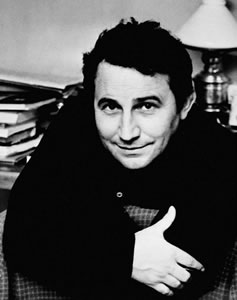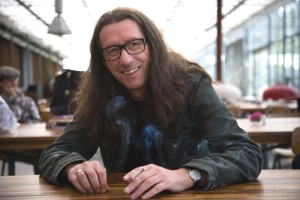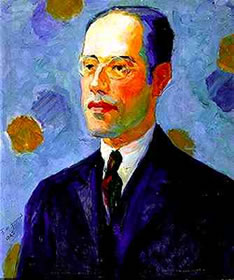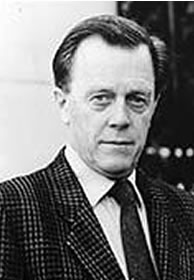De Poolse dichter en schrijver Tadeusz Różewicz werd geboren in Radomsko op 9 oktober 1921. Zie ook mijn blog van 9 oktober 2010 en eveneens alle tags voor Tadeusz Różewicz op dit blog.
Pigtail
When all the women in the transport
had their heads shaved
four workmen with brooms made of birch twigs
swept up
and gathered up the hair
Behind clean glass
the stiff hair lies
of those suffocated in gas chambers
there are pins and side combs
in this hair
The hair is not shot through with light
is not parted by the breeze
is not touched by any hand
or rain or lips
In huge chests
clouds of dry hair
of those suffocated
and a faded plait
a pigtail with a ribbon
pulled at school
by naughty boys.
Vertaald door Adam Czerniawski
Transformations
My little son enters
the room and says
‘you are a vulture
I am a mouse’
I put away my book
wings and claws
grow out of me
their ominous shadows
race on the walls
I am a vulture
he is a mouse
‘you are a wolf
I am a goat’
I walked around the table
and am a wolf
windowpanes gleam
like fangs
in the dark
while he runs to his mother
safe
his head hidden in the warmth of her dress
Vertaald door Czeslaw Milosz

In 1979
De Vlaamse schrijver Herman Brusselmans werd geboren in Hamme op 9 oktober 1957. Zie ook mijn blog van 9 oktober 2010 en eveneens alle tags voor Herman Brusselmans op dit blog.
Uit: Doodgaan zonder te sterven
„Op 6 juli 1992 lig ik in bed, bezopen zoals altijd in die tijd. Enfin, ik word wakker en kijk naar buiten. Een stralende dag, geen zuchtje wind, blablabla. Ik draai me om en ga weer slapen. Who cares? Ik woonde toen in een vrijgezellenflat met kleine raampjes met luikjes. Opeens schrik ik wakker van het geklapper van die luikjes, echt harde slagen zo. Ik kijk op de klok, half twaalf en denk: veel te vroeg. De raampjes (eigenlijk: luikjes, BV) blijven klapperen, dus ik ga mijn bed uit en loop naar het raam. Ik kan echter geen enkele fysieke of fysische verklaring voor het klapperen vinden.’
‘Ik poets mijn tanden, ga naar een afspraak en kom ’s avonds weer thuis. Gaat de telefoon: mijn moeder is vanmorgen om half twaalf gestorven. Shit. Die luikjes zijn zonder enige verklaring gaan klapperen nét op het moment dat mijn moeder sterft. Dan heb je toch zoiets van: die is afscheid komen nemen.’
‘Bij alles wat je zegt over de dood, kom je op een punt dat je zegt: nou, tot hier kan ik vrij rationeel dit of dat zeggen, maar de volgende stap is onduidelijk. Dat is wat ik tegen heb op religie. Dat is zo’n man – meestal zijn dat ook weer mannen hè, de paus, de pastoor en de dominee – dat zo’n man dan wel even gaat zeggen tegen de menselijke horden hoe dat het zit met de dood. Ik begrijp wel dat religie voor troost zorgt; als mensen horen dat er na de dood nog iets is, dan zijn ze opgelucht. Vandaar ook die zelfmoordenaars van de islam. Die denken: morgen zitten we toch in de hemel fantastisch te zijn.’
‘Natuurlijk is het ook heel eenvoudig om, laten we zeggen, voor 99% daar niet in te geloven en dat ene procent achter de hand te houden. Dat doe ik eigenlijk ook. Wat is daar op tegen? Het is toch allemaal maar pure speculatie. En die 1% vul ik vervolgens wel zelf in. Vroeger bad ik op een vrij naïeve manier tegen een soort god: God, zorg ervoor dat ik morgen mijn examen haal, God zorg ervoor dat dat meisje straks mijn huis passeert, want dan kan ik haar aanspreken, enzovoorts.’
‘Dat godsbeeld is na mijn moeders dood vervangen door mijn moeder. Dus mijn moeder is niet dood voor mij, mijn moeder is God geworden. Het is ook veel gemakkelijker om iemand die je zeer nauw aan het hart ligt, tot God te benoemen. Je hebt daar een effectief juist beeld van. Veel mensen stellen zich bij God een oude man met een baard voor. Een vrij dwaas beeld, als je niet van de ratten besnuffeld bent, absoluut. Maar dat beeld van mijn moeder is níet dwaas. Zij is mijn God, zij is ergens, zij luistert naar mij.’

Herman Brusselmans (Hamme, 9 oktober 1957)
De Braziliaanse dichter en schrijver Mário de Andrade werd op 9 oktober 1893 in São Paulo in Brazilië geboren. Zie ook mijn blog van 9 oktober 2010 en eveneens alle tags voor Mário de Andrade op dit blog.
The Mountains of Rolling-Girl
The Mountains of Rolling-Girl
Had not that name before…
They were from the other side,
They rode to town to marry.
And they crossed the mountains,
The bridegroom with the bride,
Each one on a horse.
Both of them were happy,
In the heavens all was peace.
Along the narrow trails
He rode ahead and she behind.
And they laughed. O how they laughed!
They laughed for no reason at all.
The Mountains of Rolling-Girl
Had not that name before.
The red tribes of evening
Rapidly rode away
And hurriedly hid themselves
Down down in the caves,
Afraid of the coming night.
But both of them continued,
Each one on a horse,
And they laughed. O wow hey laughed!
And their laughter married
With laughter of the pebbles
Which leaped so lightly
From the narrow path
Towards the precipice.
Ah, Fortune inviolate!
One hoof has stepped in error.
The bride and her horse vaulted
Headlong down the chasm.
Not even the thud was heard.
There is only the silence of death.
In the heavens all was peace…
Spurring and whipping his horse,
The bridegroom vaulted headlong
Into the void of the chasm.
And the mountains of Rolling-Girl
Rolling-Girl were named.
Vertaald door John Nist en Yolanda Leite

Portret door Tarsila do Amaral
De Britse schrijver en filmmaker Colin Clark werd geboren op 9 oktober 1932 in Londen. Zie ook alle tags voor Colin Clark op dit blog.
Uit: My Week With Marilyn
“THURSDAY 13 SEPTEMBER
The phone in the studio rang. Milton happened to be standing next to it and picked it up. His face crumpled a little when he told me, ‘It’s for you.’
It was Roger, Marilyn’s bodyguard: ‘Miss Monroe wants you to visit this evening.’
‘Me? Why me?’
Milton exploded from across the room, ‘What is my star doing phoning my third assistant director?’
Marilyn came on the line, ‘See you later, Colin. OK?’
…………….
‘Come on, Colin,’ Marilyn laughed, ‘let’s have some dinner. I’m starved. Or are you meant to be with somebody else? There’s not a Mrs Colin is there, waiting for you at home?’
I looked at her across the table and for the first time realised what was going on. Marilyn was lonely. She needed someone to talk to, someone who didn’t expect her to be clever or sexy, but just to be whatever she felt she wanted to be.”

Zie voor nog meer schrijvers van de 9e oktober ook mijn drie blogs van 9 oktober 2011.
